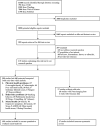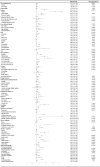Impact of digital addiction on youth health: A systematic review and meta-analysis
- PMID: 40928886
- PMCID: PMC12486297
- DOI: 10.1556/2006.2025.00081
Impact of digital addiction on youth health: A systematic review and meta-analysis
Abstract
Background and aims: Digital addiction among youth, characterized by excessive and compulsive use of digital devices such as smartphones, computers, and social media platforms, has become a global concern. The present study aimed to investigate the association between digital addiction subtypes in youth and various health outcomes using "digital addiction" as an umbrella term.
Methods: We comprehensively reviewed articles reporting health outcomes related to digital addiction in youth from the Chinese National Knowledge Infrastructure (CNKI), Wanfang, PubMed, and Web of Science databases using a targeted search strategy and assessed them using predefined inclusion and exclusion criteria.
Results: Youth with digital addiction were more likely to be overweight or obese (OR: 1.25, 95%CI: 1.03-1.48), reporting poor self-rated health (OR: 1.75, 95%CI: 1.42-2.08), and experience sleep problems such as insomnia (OR: 1.46, 95%CI: 1.33-1.59) and poor sleep quality (OR: 1.50, 95%CI: 1.37-1.64). These individuals also demonstrated higher odds of mental health concerns, including suicidal tendencies (OR: 2.63, 95%CI: 2.36-2.90), symptoms of depression (OR: 1.76, 95%CI: 1.68-1.83), stress (OR: 2.15, 95%CI: 1.79-2.52), and anxiety (OR: 2.14, 95%CI: 1.99-2.28). Furthermore, they were more prone to engage in smoking (OR: 1.55, 95%CI: 1.41-1.68), problematic alcohol consumption (OR: 1.47, 95%CI: 1.33-1.60), and drug use (OR: 1.94, 95%CI: 1.44-2.44).
Conclusions: The present findings suggest that digital addiction among youth has a significant and wide range of detrimental health outcomes, including physical, mental, and behavioral issues.
Keywords: digital addiction; health; meta-analysis; youth.
Conflict of interest statement
Figures
References
-
- Abo-Ali, E. A., Al-Ghanmi, A., Hadad, H., Etaiwi, J., Bhutta, K., Hadad, N., … Zaytoun, S. (2022). Problematic smartphone use: Prevalence and associated factors among health sciences students in Saudi Arabia. Journal of Prevention, 43(5), 659–671. 10.1007/s10935-022-00692-1https://doi.org/10.1007/s10935-022-00692-1 - DOI - DOI - PubMed
-
- Abuhamdah, S. M. A., & Naser, A. Y. (2023). Smart phone addiction and its mental health risks among university students in Jordan: A cross-sectional study. BMC Psychiatry, 23(1), 812. 10.1186/s12888-023-05322-6https://doi.org/10.1186/s12888-023-05322-6 - DOI - DOI - PMC - PubMed
-
- Acikgoz, A., Acikgoz, B., & Acikgoz, O. (2022). The effect of internet addiction and smartphone addiction on sleep quality among Turkish adolescents. PeerJ, 10, e12876. 10.7717/peerj.12876https://doi.org/10.7717/peerj.12876 - DOI - DOI - PMC - PubMed
-
- Al Shawi, A. F., Hameed, A. K., Shalal, A. I., Abd Kareem, S. S., Majeed, M. A., & Humidy, S. T. (2021). Internet addiction and its relationship to gender, depression and anxiety among medical students in Anbar Governorate-West of Iraq. International Quarterly of Community Health Education, 272684x20985708. 10.1177/0272684x20985708https://doi.org/10.1177/0272684x20985708 - DOI - DOI - PubMed
Publication types
MeSH terms
LinkOut - more resources
Full Text Sources



